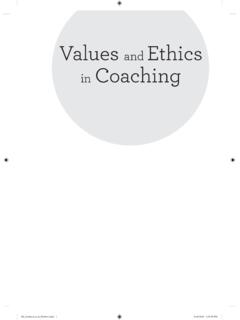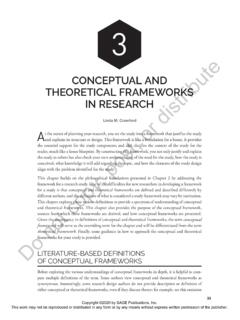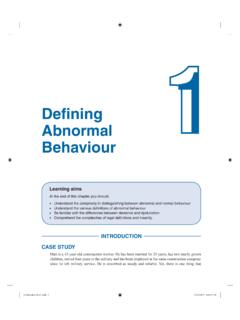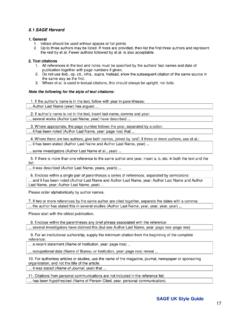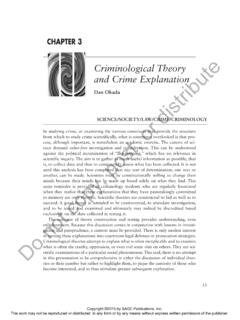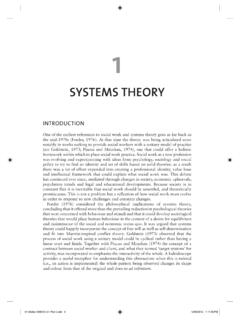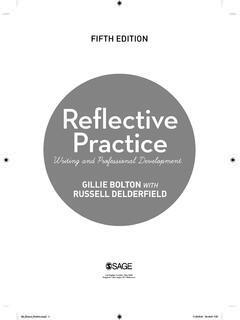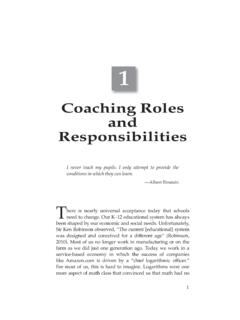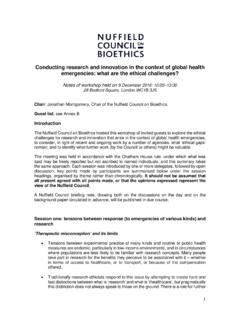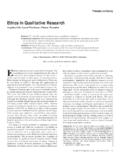Transcription of Ethical Issues in Qualitative Research - SAGE Publications
1 CChhaapptteerr44 Ethical Issues in QualitativeResearch51 FOCUSYOURREADING Researchers are responsible for ensuring that participants are not harmed, pri-vacy is maintained, and the participants have provided informed consent. Qualitative researchers do not have clear standards governing their activities. Universities rely on review boards to decide which Research activities to it is not right do not do it; if it is not true do not say it. Marcus AureliusA few years ago, I was doing a phenomenological study of teenage girls. I was interested inlearning how they coped with conflicting messages about doing well in school and not being seenas too smart. The school system had approved my proposal, and I had also received permissionfrom the parents of the girls. I promised confidentiality to the girls.
2 My plan called for me to do aminimum of two interviews with each girl. I was well into my second interview with Susan whenthe tears started to slowly roll down her cheeks. We were talking about how she wanted to do well,but she sensed that the boys might not like her if she was too brainy. But then she switched top-ics and really opened up. She started to tell me about how her stepfather was getting too friendlywith her and had touched her in those special places. I knew then that I was on very sensitive ground. Fortunately, or perhaps not so, our scheduled time together was coming to an end. I com-pleted the interview and told her I would be in touch. Now I was in quite a dilemma. What was I to do? I had promised to keep all information confidential, but if her stepfather was sexuallyabusing her, was I obligated to report it?
3 And to whom? Was she telling me the truth or just tryingto con me? What would you do?I tell you this story not to shock you but to get you thinking about the kinds of dilemmas inwhich you might find yourself when doing Qualitative Research . Even though I had followed all pro-cedures, received permissions, informed my participants, and promised confidentiality, I hadlearned some information that troubled me. I felt I had a responsibility to Susan not to reveal theconfidence. I also felt I had a responsibility to her if she was being abused. However, I really did notknow whether the story she told me was true. Because I was not part of the school system and hadno supervisor there, I did not know what to do with the story illustrates a delicate balance you might face between trying to do what is right interms of maintaining privacy and, at the same time, recognizing that you have received informa-tion that might be damaging to the participant.
4 Should you tell someone? If so, who? What aboutthe promise you made to maintain privacy?You might not have thought about ethics while you were planning your Research . Yet, recently,much has been written on the topic. I want you to think about what kinds of Issues you might faceand how you would handle them. In this chapter, I introduce you to some of the basic principlesassociated with ethics and recent controversies concerning universities and monitoring of quali-tative Research plans. I know you will find the information challenging. I hope it will cause you tothink carefully about your Research and about the people you scenario I described above is not something you will encounter on a regular basis. But I began with it to point out that you might find yourself in a situation that is unexpected and forwhich you will need to use judgment and good know that much of Qualitative Research involves interactions with individuals.
5 As a con-sequence of developing rapport with participants and getting them to trust you, you may find theyopen up to you in very personal ways. When this happens, you face an Ethical challenge. Whatshould you do with information you obtain that might be damaging to the individual or to others?You might think that there are clear guidelines available to you as a researcher to assist you ifyou encounter such challenges , but this is not the case. In your role as a teacher, counselor, admin-istrator, or therapist, you are guided by a code of conduct or set of ethics established by licensingboards or by the organization for which you work. In contrast, researchers do not have a formallicensing body. A number of organizations offer guidelines about Ethical standards, but many lackan enforcement mechanism.
6 The Ethical Standards of the American Educational ResearchAssociation were adopted in 1992 and revised in 2000 to evoke voluntary compliance by moralpersuasion (American Educational Research Association, 2005). Many universities use reviewboards to set and enforce standards. Many large school systems have this chapter, I begin with definitions of Ethical behavior. Next, I look at the major princi-ples associated with the ethics of conducting Research . I also address problems with the , I review some significant examples of unethical behavior in the general scientific com-munity as well as examine inappropriate behavior in the field of Qualitative Research . I look nextat some special problems faced by Qualitative researchers. I conclude with the Issues of setting andenforcing standards of I TRADITIONS AND INFLUENCES Et hical Behavior: Definitions and BackgroundAs I began this chapter, I asked myself, What is the meaning of ethics and Ethical behavior?
7 Seems straightforward, doesn t it? In laymen s terms, we all know what we mean when we sayethics or Ethical behavior. I think there are various commonsense responses to the question. Itmeans doing what is right. It means treating people fairly. It means not hurting deal with Ethical Issues on a daily basis. Should you report someone who cheats on anexam or copies someone else s writing? Should you return that extra dollar given to you by a clerkor keep a wallet found on the street? Should you give children additional time to finish an exam orprovide answers to difficult questions on a test?Randy Cohen, who writes a weekly column The Ethicist for The New York Times,providesa popular and accessible vehicle for us to examine our belief system. Here is a recent problem andhis response; his tone is of my grad students copied a term paper from the Internet, cutting and pasting from various uncred-ited sources.
8 The university s rules say expulsion or an F in the course is appropriate, but I proposed that shesearch out the several dozen articles she used to compose her paper and write each author an apology. Iwill mail the letters. My department chair thinks this is unethical a cruel and unusual punishment. You? P. R., HoustonUnusual? Quite likely, but that s not necessarily a bad thing. A roomy and inexpensive Manhattanapartment is unusual. Cruel? I think not. This cheater is even spared the torment of visiting the postoffice to mail the apologies. But effectual? I doubt it. And that is key. Your task as a professor is toreinforce a respect for academic integrity and to preserve it in your classroom. I m skeptical thatyour method will do either (R. Cohen, 2007).Cohen s weekly column illustrates the public s need for guidance in handling Issues theyface daily.
9 What Cohen does so well is to present the issue and his response in a no-nonsense,easy-to-understand manner. I do not know who sets his moral compass, but I suspect he can learn more about him through various National Public Radio (NPR) interviews( ). There is no Cohen around for the Ethical dilemmasresearchers face. We need to rely on various guidelines from several sources. Ultimately, we needto rely on our own moral 4 Ethical Issues in Qualitative Research 53 Did You KnowIt was in 1906, when the Pure Food and Drug Act was passed, that regulations regard-ing the use of human subjects in Research came into is a general definition: Ethical behavior represents a set of moral principles, rules, orstandards governing a person or a profession. We understand that to be Ethical is to do good andavoid evil.
10 This general definition is helpful as we try to understand Research ethics. Below, I discusswhat I consider to be the major principles of Ethical behavior associated with Research thatinvolves human subjects, rather than Research on animals. In particular, I am interested in quali-tative Research , although I offer you some background on unethical conduct in Research on human subjects has been conducted since the Middle Ages, codes ofconduct regarding appropriate researcher behavior did not emerge until the 20th century. It wasnot until the 1960s, when federal government funding became available, that more researchersbecame interested in school-based Research . At first, there were no clear guidelines. But as moreresearch was conducted in schools, it became necessary for many institutions to establish reviewboards.
